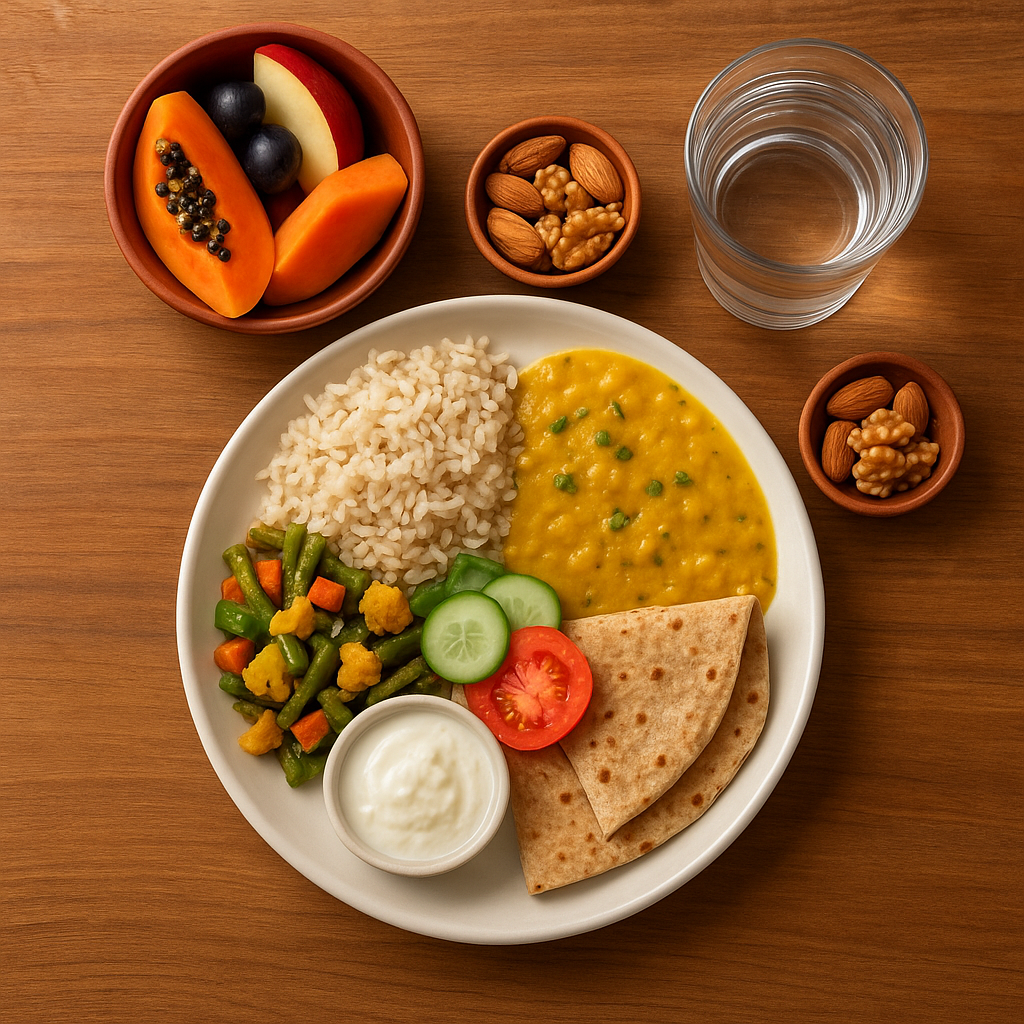Have you ever felt drained by mid-afternoon, reached for a sugary snack, and wondered why you just can’t seem to feel energized no matter how much you eat? You are not alone. In today’s fast-paced life, with back-to-back classes, long work hours, and endless notifications, maintaining a healthy diet often feels impossible. But here’s the good news: staying nourished doesn’t have to mean strict restrictions or giving up your favorite foods. It’s about feeling vibrant, energetic, and happy while taking care of your body every day.
Imagine starting your morning feeling refreshed, having steady energy throughout the day, and sleeping peacefully at night—all because you made simple, mindful food choices. That’s the power of a healthy diet routine.
What Exactly Is a Healthy Diet Routine?
A healthy diet routine isn’t about avoiding certain foods—it’s about balance. Your body needs carbohydrates, proteins, healthy fats, vitamins, minerals, and water in the right proportion to function optimally.
The Role of Carbohydrates, Proteins, and Fats
- Carbohydrates: Your body’s main source of energy. Swap refined grains with whole grains like brown rice, whole-wheat chapati, and oats to keep your energy levels steady.
- Proteins: Essential for muscle repair and growth. Include pulses, eggs, fish, paneer, and nuts in your meals.
- Healthy Fats: Vital for brain function and overall health. Opt for avocado, olive oil, seeds, and nuts.
Why Vitamins, Minerals, and Water Matter
- Vitamins & Minerals: These micronutrients strengthen immunity, aid in tissue repair, and support countless body functions.
- Water: Proper hydration keeps digestion smooth, skin glowing, and energy levels up.
Remember, a healthy diet doesn’t eliminate food groups—it balances them thoughtfully. Think of your plate as a colorful canvas: the more colors, the better the nutrition.
How to Build a Daily Diet Plan That Actually Works
Your eating pattern matters as much as what you eat. Regular meals help your metabolism function efficiently and prevent energy crashes. Here’s a practical breakdown you can follow:
Healthy Breakfast Ideas to Kickstart Your Day
Breakfast sets the tone for your entire day. Here are some simple ideas:
- Warm water with lemon to detox first thing in the morning
- Oats with fruits, nuts, and a drizzle of honey
- Vegetable poha or upma for a light yet fulfilling start
- Whole-grain toast with peanut butter
- Smoothie with banana and spinach for a nutrient-packed drink
Mid-Morning Snacks That Keep You Energized
Hunger between meals is normal, but choosing wisely keeps your energy stable:
- A fresh fruit like apple, papaya, or orange
- A handful of almonds or walnuts
- Yogurt topped with chia seeds
Balanced Lunch for Sustained Energy
Lunch is your body’s fuel for the second half of the day. Make it balanced:
- Whole grains: brown rice, quinoa, or chapati
- Protein: dal, paneer, lean chicken, or fish
- Vegetables: fill half your plate with fresh or cooked veggies
- Salad and buttermilk to aid digestion
Smart Evening Snacks
Keep it light yet nourishing:
- Roasted chana or makhana
- A bowl of fruit salad
- Green tea with multigrain crackers
Light Dinner for Better Sleep
Heavy dinners can disturb sleep. Try:
- Vegetable soup with whole-wheat bread
- Khichdi with curd
- Grilled vegetables with dal and chapati
Hydration: The Unsung Hero of Daily Health
Often overlooked, hydration is essential for metabolism, digestion, and overall vitality.
How Much Water Should You Drink?
Aim for 8–10 glasses daily. If plain water feels boring, infuse it with lemon, cucumber, or mint for a refreshing twist. Herbal teas are also excellent alternatives to sugary drinks.
Lifestyle Habits That Support a Healthy Diet
Eating well is just one part of the puzzle. Combine it with positive lifestyle habits:
Mindful Eating
- Eat slowly and chew properly
- Avoid distractions like TV or mobile phones
- Listen to your body’s hunger and fullness cues
Stay Active
- Walk for 30 minutes daily
- Try yoga, stretching, or light exercises
- Physical activity helps digestion and boosts heart health
Sleep Well
Poor sleep can trigger cravings and disrupt appetite. Aim for 7–8 hours of restful sleep every night.
Limit Junk Food
- Avoid fried snacks, packaged sweets, and sugary beverages
- Treat yourself occasionally but in moderation
Common Challenges in Maintaining a Diet Routine
Even when you are motivated, real life can get in the way:
Busy Schedules
Prepare meals in advance and carry healthy snacks to avoid last-minute unhealthy choices.
Food Cravings
Instead of reaching for a candy bar, try dark chocolate, fruit, or nuts to satisfy your cravings.
Eating Out
Choose grilled, baked, or steamed options over fried foods when dining out.
Emotional Eating
Stress often leads to mindless eating. Meditation, journaling, or even a short walk can help you regain control.
Sample Healthy Daily Diet Routine
Here’s a practical template you can try:
- 7 AM: Warm water with lemon
- 8 AM: Oats with fruits & nuts
- 11 AM: Apple + almonds
- 1 PM: Brown rice, dal, sabzi, salad, curd
- 4 PM: Roasted chana + green tea
- 7 PM: Soup + 2 chapatis + stir-fry vegetables
- 9 PM: Herbal tea or warm milk
Small Changes That Make a Big Difference
You don’t have to overhaul your diet overnight. Start small:
- Replace one snack with fruit
- Drink an extra glass of water daily
- Add more vegetables to your plate
These small, consistent steps can transform your eating habits over time.
Final Thoughts: Nourish Your Body, Elevate Your Life
A healthy diet is not about perfection. It’s about progress, consistency, and self-care. By eating balanced meals, staying hydrated, sleeping well, exercising, and managing stress, you invest in your most valuable asset—your health.
Remember, health is wealth. Nourish your body daily, and it will reward you with energy, strength, and happiness. Start today, and watch small changes create big transformations.
The future is healthy, and so can your life be.
Sources –





